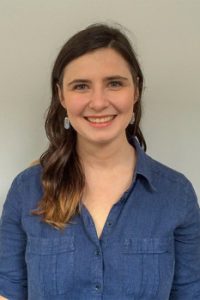Caitilin McMillan is a Rotary Peace Fellow and doctoral student in geography. She plans to pursue a master’s degree in clinical rehabilitation and mental health counseling, leading to a joint degree at UNC-Chapel Hill. Her work focuses on peacebuilding with justice and, in particular, enhancing how psychosocial needs and trauma are addressed in communities affected by conflict. Caitilin grew up in Toronto and has spent the last decade living and working around the world. She received her master’s degree in migration studies from the University of Oxford and her bachelor’s degree in global development studies from Queen’s University in Canada.

What made you choose UNC-Chapel Hill when deciding on a program/place to study?
UNC’s geography department had always been on my radar! It offers an amazingly rich intellectual and social community at the forefront of working on peace and justice issues close to my heart. I was looking for a place that would provide mentorship, critical thinking, and engaged scholarship. I’ve found all that and more since arriving! After taking a long break between completing my master’s and starting my Ph.D. to work with communities on international development and humanitarian responses across West Africa, Asia, Europe, and North America, I was also thrilled to receive a fellowship and join the Duke-UNC Rotary Peace Center, which supports professionals working in peacebuilding and conflict resolution to return to school and deepen their skills.
Tell us about your research.
As a geographer, I’m interested in the spaces we imagine, create, and share in society. My research is drawn together by the theme of peacebuilding in order to improve our relationships, communities, and daily lives. Bringing in mental health practice and attention to psychosocial space is particularly important for me as I saw firsthand the challenges people face in rebuilding their lives after conflict and the gaps in how humanitarian and international development support is provided. I also draw a lot on feminist and decolonial frameworks, recognizing that women bear an unjust toll in conflict situations, and also that these frameworks offer other worldviews that give us a way into unsettling structures of exclusion and harm.
What are some of your favorite places and things to do in your home country?
Canada has so much natural beauty from the mountains and lakes to the wildlife. When I’m home, I love getting out into nature. However, I’d be lying if I said I didn’t also love the city. Toronto, where I’m from, is a fun, welcoming, and diverse place! I’d recommend visiting Kensington Market, where there’s a rich layered history of Jewish, Caribbean, and Latin American merchants, among others. It’s also important to acknowledge that Toronto is on the traditional territory of Indigenous nations including the Anishnabeg, and is today home to many diverse First Nations, Inuit, and Métis peoples.
What are you hoping to accomplish with your Carolina degree?
I hope my work will make a difference by improving the way we think about and create psychosocial support for communities, particularly those affected by conflict. I hope to bring an ethic of social justice into this work. With a joint degree in geography and clinical rehabilitation and mental health counseling, I’m able to marry health practitioner training with a macro view that helps me challenge unjust policies and societal structures.
